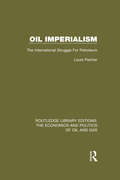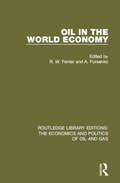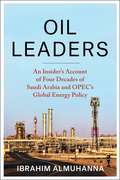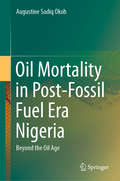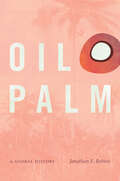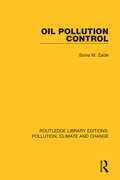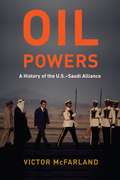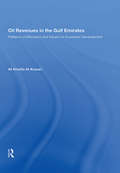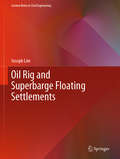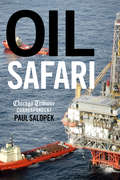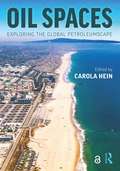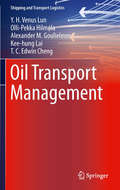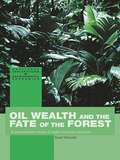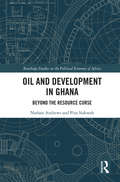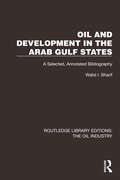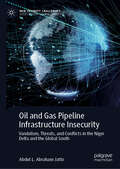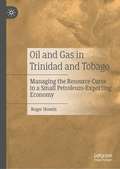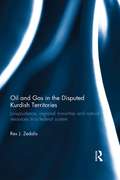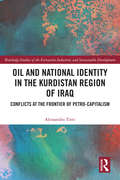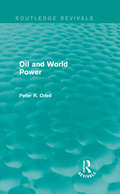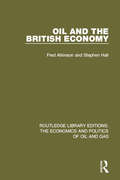- Table View
- List View
Oil Imperialism: The International Struggle for Petroleum (Routledge Library Editions: The Economics and Politics of Oil and Gas #4)
by Louis FischerThe close dovetailing between the interests of oil trusts and the policies of diplomats was one of the most significant and absorbing political developments of 1910-1920. This book examines the growing importance of oil to Soviet Russia at the start of the twentieth century and the impact this had on the geo-politics of the region.
Oil In The World Economy (Routledge Library Editions: The Economics and Politics of Oil and Gas #3)
by R. W. Ferrier A. FursenkoThis book discusses the oil industry and its impact on the world economy in the twentieth century. It examines the importance of oil in different sectors, from 1900-1973 and stresses the relevance of oil as a factor in modern economic history not only in national terms but also within an international context. The book includes chapters on American policy towards developing economies in the first half of the 20th century; the policy of Russian oil exports in the 20s and 30s; the financing of the German and French oil industries; and the role of oil in the Japanese economy, a major industrial country without oil resources. On the international front, the book covers the impact of the Middle East national oil companies, the effect of oil on the developing countries of South Ameirca and the relevance of the oil crisis of 1973.
Oil Leaders: An Insider’s Account of Four Decades of Saudi Arabia and OPEC's Global Energy Policy (Center on Global Energy Policy Series)
by Ibrahim AlMuhannaOil is an unusual commodity in that individual decisions can have an outsized effect on the market. OPEC+’s choice to increase production, for instance, might send prices falling, affecting both oil producers and consumers worldwide. What do the leading oil market players consider before making a fateful move?Oil Leaders offers an unprecedented glimpse into the strategic thinking of top figures in the energy world from the 1980s through the recent past. Ibrahim AlMuhanna—a close adviser to four different Saudi oil ministers during that period—examines the role of individual and collective decision making in shaping market movements. He analyzes how powerful individuals made critical choices, tracking how they responded to the flow of information on pivotal market and political events and predicted reactions from allies and adversaries. AlMuhanna highlights how the media has played an increasingly important role as a conduit of information among multiple players in the oil market. Energy leaders have learned to manage the signals they send to the market and to other relevant players in order to avoid sending oil prices into a spiral.AlMuhanna draws on personal familiarity with many of these individual decision makers as well as his participation in decades of closed-door sessions where crucial choices were made. Featuring revelatory behind-the-scenes perspective on pivotal oil market events and dynamics, this book is a must-read for practitioners and policy makers engaged with the global energy world.
Oil Mortality in Post-Fossil Fuel Era Nigeria: Beyond the Oil Age
by Augustine Sadiq OkohThis book provides an insight into the complexities of weaning Nigeria from its fossil fuels addiction while growing the economy on low carbon trajectory. Nigeria faces a carbon catch 22 with the proliferation of renewable energy alternatives and scale-up of electric vehicles. The dilemma Nigeria is confronted with is to grow its fossil-led economy or face the challenge of its fossil infrastructure becoming stranded assets. It is a roadmap for plotting an environmentally benign path out of the country’s economic, social and environmental crises. This book is, therefore, a valuable resource for students, Civil Society Organizations, policymakers, academics and climate change adaptation practitioners who are interested in finding an environmentally sensitive path out of Nigeria’s economic cul-de-sac fostered by the decarbonization of the global energy economy. Findings of this study will trigger a national conversation on the looming exit from fossil fuels. In doing so, accelerate the integration of renewable energy into the Nigerian national development plan while building a carbon neutral society. Lessons learnt from the handling of Nigeria’s precarious circumstance will be of immense benefit to other oil prospecting, oil producing and non-producing nations who are interested in finding an equitable way of pursuing two inversely related goals of meeting their decarbonization commitments while simultaneously growing their economies in the post-Paris era.
Oil Palm: A Global History (Flows, Migrations, and Exchanges)
by Jonathan E. RobinsOil palms are ubiquitous—grown in nearly every tropical country, they supply the world with more edible fat than any other plant and play a role in scores of packaged products, from lipstick and soap to margarine and cookies. And as Jonathan E. Robins shows, sweeping social transformations carried the plant around the planet. First brought to the global stage in the holds of slave ships, palm oil became a quintessential commodity in the Industrial Revolution. Imperialists hungry for cheap fat subjugated Africa's oil palm landscapes and the people who worked them. In the twentieth century, the World Bank promulgated oil palm agriculture as a panacea to rural development in Southeast Asia and across the tropics. As plantation companies tore into rainforests, evicting farmers in the name of progress, the oil palm continued its rise to dominance, sparking new controversies over trade, land and labor rights, human health, and the environment. By telling the story of the oil palm across multiple centuries and continents, Robins demonstrates how the fruits of an African palm tree became a key commodity in the story of global capitalism, beginning in the eras of slavery and imperialism, persisting through decolonization, and stretching to the present day.
Oil Pollution Control
by Sonia M. ZaideOil pollution has been a major environmental concern since the 1920s. The search for a solution has ranged from prevention to partial measures coupled with compensation and remedial action. This book, originally published in 1987, offers a different assessment of the efforts of governments and the oil and maritime industries. It was also the first book to provide a comprehensive story of control policies and practices, using primary and secondary sources. The book identified numerous factor – personalities, state policies, developments in the oil and shipping industries, public agitation and scientific studies in a framework useful for analysing any environmental problem.
Oil Powers: A History of the U.S.-Saudi Alliance
by Victor McFarlandSince the mid-twentieth century, the United States and Saudi Arabia have built a close but often troubled alliance. In this critical history, Victor McFarland reveals the deep ties binding the leaders of the two nations. Connecting foreign relations and domestic politics, McFarland challenges the view that the U.S.-Saudi alliance is the inevitable consequence of American energy demand and Saudi Arabia’s huge oil reserves. Oil Powers traces the growth of the alliance through a dense web of political, economic, and social connections that bolstered royal and executive power and the national-security state. McFarland shows how U.S. and Saudi elites collaborated to advance their shared interests against rivals at home and abroad. During the 1970s, as higher oil prices enriched the Saudi government, destabilized the American economy, and changed the balance of power in the Middle East, leaders of both countries responded by consolidating their alliance. Facing objections from their own people, Washington and Riyadh chose to shield their partnership from public oversight and accountability. While American support empowered the Saudi royal family and helped the kingdom expand its influence across the Middle East, Saudi elites also encouraged a rightward shift in U.S. foreign and economic policy—with profound long-term effects. Oil Powers reveals the role of the U.S.-Saudi alliance in laying the groundwork for American military involvement in the Middle East and the entrenchment of a global order fueled by oil.
Oil Prices and Bank Profitability: Evidence from Major Oil-Exporting Countries in the Middle East and North Africa
by Tigran Poghosyan Heiko HesseA report from the International Monetary Fund.
Oil Revenues In The Gulf/h
by Ali Khalifa Al-KuwariThis book is a major contribution to our understanding of the Gulf Emirates, illuminating many aspects of the socio-economic forces and processes operating on and in the region. It assesses actual oil revenues received and shows the impact oil revenues have had on economic development.
Oil Rig and Superbarge Floating Settlements (Lecture Notes in Civil Engineering #82)
by Joseph LimThis book presents a collection of proposed offshore and nearshore settlements in response to the emerging consequences of climate change. These settlements are counterpoints to megacities with unsustainable ecological footprints. The continuing depletion of natural resources has resulted in displaced communities, prompting the following research questions: What if we floated on sea instead of inefficiently consuming land? Could we use wave energy instead of nuclear energy? How can we replenish food supply and regenerate marine eco-diversity? How would our lives be shaped by new offshore settlements? What would we use as structures for shelter, farming, scaffolding and recreation? Floating cities emerged in the 1960s with Buckminster Fuller’s Triton City and Kenzo Tange’s Tokyo Bay Plan, and current manifestations include Vincent Callebaut’s Lilypad, the Seasteading Institute and the mile-long Freedom Ship housing 50,000 people. As an alternative to these examples, the book proposes the repurposing of three types of marine vessel: jack-up platforms, semi-submersibles and superbarges as sustainable, habitable structures to accommodate 20% of the projected 8.1 billion global population in 2025. The spatially conceived floating settlements include food and energy supplies for housing, recreation, education at sea, post-disaster health care and resettlement for nearshore deployment.
Oil Safari
by Paul F. SalopekWould Americans pay more attention to their sources of petroleum-the lifeblood of their car-centric society-if gasoline came with a price tag tallying the explicit human costs of each fill-up? What untold stories of war, poverty and corruption get burned up and expelled from millions of U.S. tailpipes every day? And do false industry assurances that fuel can never be traced from local service stations back to its origins in troubled foreign oil patches help absolve us of responsibility for the wages of our energy addiction?Two-time Pulitzer Prize-winning journalist Paul F. Salopek, a Chicago Tribune foreign correspondent, tackles these questions that are at the heart of Oil Safari: In Search of the Source of America's Fuel. Taken from Salopek's four-part narrative travelogue published in 2006, this book debunks the well-tended industry myth that global oil flows are too complex and fungible to tease apart at a retail outlet.Salopek describes the gripping stories of a diverse cast of characters who are touched by a typical shipment of oil that ends up in the U.S. There is the oil rig worker in the Gulf of Mexico, an Iraqi security consultant, a Nigerian fisherman whose homeland is threatened by drilling, and an indigenous Venezuelan elder who benefits from the country's oil reserves (which are used to fund social programs).Energy policy is at the heart of American politics now more than ever, between the troubling aftermath of the BP Deepwater Horizon oil spill, the burgeoning American surplus of natural gas, and the Obama administration's continued emphasis on renewable energy sources. Oil Safari brings human narratives to the foreground of our energy policy debates and own personal consumption habits.
Oil Spaces: Exploring the Global Petroleumscape
by Carola HeinOil Spaces traces petroleum’s impact through a range of territories from across the world, showing how industrially drilled petroleum and its refined products have played a major role in transforming the built environment in ways that are often not visible or recognized. Over the past century and a half, industrially drilled petroleum has powered factories, built cities, and sustained nation-states. It has fueled ways of life and visions of progress, modernity, and disaster. In detailed international case studies, the contributors consider petroleum’s role in the built environment and the imagination. They study how petroleum and its infrastructure have served as a source of military conflict and political and economic power, inspiring efforts to create territories and reshape geographies and national boundaries. The authors trace ruptures and continuities between colonial and postcolonial frameworks, in locations as diverse as Sumatra, northeast China, Brazil, Nigeria, Tanzania, and Kuwait as well as heritage sites including former power stations in Italy and the port of Dunkirk, once a prime gateway through which petroleum entered Europe. By revealing petroleum’s role in organizing and imagining space globally, this book takes up a key task in imagining the possibilities of a post-oil future. It will be invaluable reading to scholars and students of architectural and urban history, planning, and geography of sustainable urban environments.
Oil Tanker Shipping Industry in 1983
by Michael E. Porter Richard RawlinsonDescribes the international oil tanker shipping industry both historically and in 1983. Designed to provide a vehicle for practicing industry analysis in a volatile commodity business, and for formulating strategy in such an environment. Also can be used to examine industry capacity overexpansion and vertical integration policies of oil companies who own some but not all of the ships they use to transport their oil.
Oil Transport Management
by Kee-Hung Lai Alexander M. Goulielmos T.C. Edwin Cheng Olli-Pekka Hilmola Y.H. Venus LunThe first volume in a new Springer Series on Shipping and Transport Logistics, Oil Transport Management provides a full historical account of the evolution of the oil transport industry since the 1800's. In this comprehensive guide, the authors investigate the industry and describe the shipping market and its structure, as well as forecasting, location plan and the transportation chain. They dedicate a separate chapter to each topic to cover various concepts, including: an introduction to the tanker shipping market, including how the freight, new vessel building, second hand and demolition markets influence one another, the economic structure and organization of the tanker industry in both the past and present, and forecasting the need for oil-based sea transportation. Further chapters present case studies and simulations to illustrate the importance of factory location decisions and the need for oil infrastructure investments. Chapter One also includes a regression equation to predict the fleet size in tanker shipping. Oil Transport Management is a key reference, which can be practically applied to wider global research and practices. Ideal for both industry practitioners, and researchers and students of shipping studies, Oil Transport Management provides a concise yet comprehensive coverage of the oil transport industry's history and a guide for its future development.
Oil Wealth and the Fate of the Forest: A Comparative Study of Eight Tropical Countries (Routledge Explorations in Environmental Economics #Vol. 2)
by Sven WunderReduction in the size of the world's remaining rainforests is an issue of huge importance for all societies. This new book - an analysis of the impact of oil wealth on tropical deforestation in South America, Africa and Asia - takes a much more analytical approach than the usual fare of environmental studies. The focus on economies as a whole leads to a more balanced view than those that are often put forward and therefore, vitally, a view that is more valid. Of use to those who study environmental issues and economics, this book is potentially an indispensable tool for policy-makers the world over.
Oil Windfalls in Ghana: A DSGE Approach
by Rafael Portillo Jan Gottschalk Jihad DagherA report from the International Monetary Fund.
Oil and Development in Ghana: Beyond the Resource Curse (Routledge Studies on the Political Economy of Africa)
by Nathan Andrews Pius SiakwahThis book gives a comprehensive overview of Ghana’s hydrocarbon economy using actor network and assemblage theories to contest the methodological nationalism of mainstream accounts of the resource curse in resource-rich countries. Drawing upon recent field research focused on Ghana’s oil and gas sector and utilizing the theoretical framework of actor network theory, the authors contend that there is an assemblage of political, economic, social and environmental networks, processes, actions, actors, and structures of power that coalesce to determine the extent to which the country’s hydrocarbon resources could be regarded as a "curse" or "blessing." This framing facilitates a better understanding of the variety (and duality) of local and global forces and power structures at play in Ghana’s growing hydrocarbon industry. Giving a nuanced and multi-perspectival analysis of the factors that underlie oil-engendered development in Ghana, this book will be of interest to students and scholars of African political economy, development and the politics of resource extraction.
Oil and Development in the Arab Gulf States: A Selected, Annotated Bibliography (Routledge Library Editions: The Oil Industry #5)
by Walid I. SharifOil and Development in the Arab Gulf States (1985) brings together in one volume the manifold sources of information on the Arab Gulf region, especially the impact of oil revenues on its economic, political and social development. It provides a balanced core of primary and secondary sources on various aspects of the economics of Arab oil between 1973 and 1983.
Oil and Gas Pipeline Infrastructure Insecurity: Vandalism, Threats, and Conflicts in the Niger Delta and the Global South (New Security Challenges)
by Abdul L. JattoThis book offers a comprehensive analysis of infrastructure insecurity issues in the historic Niger Delta, drawing on empirical fieldwork involving host communities, regulators, and multinational oil and gas operators. It introduces innovative models and theories, such as a pipeline life cycle model focusing on community development, community neglect aggression displacement theory, social aggression theory, stakeholders’ policy development model, contemporary poor governance cycle model, and an infrastructure insecurity nexus model, linking governance, socio-economic conditions, and infrastructure insecurity in resource-rich regions of the Global South. The book bridges gaps left by previous publications, providing depth and applicability of data. It employs the Frustration- Aggression Displacement theory to explain underlying triggers of violence and uses real-world case studies, diagrams, and charts to facilitate understanding. Suitable and engaging for individuals, communities, or regulators involved in oil and gas activities alike, this book offers valuable insights into onshore pipeline infrastructure insecurity in Nigeria, West Africa, and the broader Global South, addressing regulation, compliance, environmental concerns, social aspects, and technological innovations.
Oil and Gas in Trinidad and Tobago: Managing the Resource Curse in a Small Petroleum-Exporting Economy
by Roger HoseinOil and Gas in Trinidad and Tobago presents a historical economic review of the energy sector of Trinidad and Tobago, followed by a detailed evaluation of policies associated with resource abundance and the effects on the economy from various perspectives, including industrialization, labor productivity, education, export diversification, and competitiveness. This book utilizes a wide range of statistical data and methodologies to both economically and statistically analyze these issues at hand. The content of this book will be useful not only for policymakers but also for researchers and students interested in the field.
Oil and Gas in the Disputed Kurdish Territories: Jurisprudence, Regional Minorities and Natural Resources in a Federal System
by Rex J. ZedalisThis book examines the historical and contextual background to the oil and gas resources in the Kurdish territories, placing particular emphasis on the reserves situated in the disputed provinces. The volume is singularly unique in focusing on an examination of the rules reflected in both the national and the regional constitutional, legislative, and contractual measures and documents relevant to the question of whether the central government in Baghdad or the Kurdish Regional Government (KRG) in Erbil has a stronger claim to legal control over the oil and gas resources in the disputed Kurdish territories. As a subsidiary focus, the author also draws attention to how the basic thrust of the volume connects to broader jurisprudential issues regarding the nature and purpose of law, the matter of claims by native peoples to natural resources on traditional lands, and the place of regional minorities operating in a federal system. Since the law examined is domestic or municipal in origin, additional reference is made to the role that such law can play in the "bottom up" (as opposed to more conventional "top down") development of international law. The book’s opening chapters provide a valuable contextual introduction, followed by a number of substantive chapters providing an analytical and critical assessment of the controlling legal rules. Written in a scholarly, yet accessible style, and covering matters of basic importance to academics, lawyers, political scientists, government representatives, and students of energy and natural resources, as well as those of developing legal structures, Oil and Gas in the Disputed Kurdish Territories is an essential addition to any collection.
Oil and Governance: State-Owned Enterprises and the World Energy Supply
by David G. Victor David R. Hults Mark C. ThurberNational Oil Companies (NOCs) play an important role in the world economy. They produce most of the world's oil and bankroll governments across the globe. Although NOCs superficially resemble private-sector companies, they often behave in very different ways. Oil and Governance explains the variation in performance and strategy for NOCs and provides fresh insights into the future of the oil industry as well as the politics of the oil-rich countries where NOCs dominate. It comprises fifteen case studies, each following a common research design, of NOCs based in the Middle East, Africa, Asia, Latin America and Europe. The book also includes cross-cutting pieces on the industrial structure of the oil industry and the politics and administration of NOCs. This book is the largest and most systematic analysis of NOCs to date and is suitable for audiences from industry and academia, as well as policy makers.
Oil and National Identity in the Kurdistan Region of Iraq: Conflicts at the Frontier of Petro-Capitalism (Routledge Studies of the Extractive Industries and Sustainable Development)
by Alessandro TintiExamining the interplay between the oil economy and identity politics using the Kurdistan Region of Iraq as a case study, this book tells the untold story of how extractivism in the Kurdish autonomous region is interwoven in a mosaic of territorial disputes, simmering ethnic tensions, dynastic rule, party allegiances, crony patronage, and divergent visions about nature. Since the ousting of Saddam Hussein, the de-facto borders of the Kurdistan Region of Iraq have repeatedly changed, with energy interests playing a major role in such processes of territorialisation. However, relatively little research exists on the topic. This book provides a timely, empirical analysis of the intersections between extractive industries, oil imaginaries, and identity formation in one of the most coveted energy frontiers worldwide. It shines a light on relations between the global production networks of petro-capitalism and extractive localities. Besides the strained federal relationship with the Iraqi central government, the transformative effects the petroleum industry has had on Kurdish society are also explored in depth. Moreover, the book fills a gap in the literature on Kurdish Studies, which has devoted scant attention to energy-related issues in the re-imagination of Kurdish self-determination. This book will be of great interest to students and scholars of the extractive industries, energy studies, conflict studies, Middle Eastern politics, and political ecology.
Oil and World Power: A Geographical Interpretation (Routledge Revivals)
by Peter R. OdellThe oil industry is the world’s largest commercial enterprise. Its extent is global; international issues are consistently influenced by considerations of oil production and consumption, while the international communications networks of the larger oil companies rival those of many nations. In this, the eighth edition of Oil and World Power, published in 1986, Peter Odell explains the complexities of this gigantic empire and its influence on the world. The far-reaching chapters discuss the U.S.A, the Soviet Union, O.P.E.C., Japan and the oil-consuming countries of the developing world. Evaluating the changing patterns of oil supply and the dramatic fall in oil prices in 1986, Odell proposes a number of forward-thinking conclusions surrounding the relationship between oil in global politics and economic development. This is an exceptionally interesting and relevant work, of great value to those with an interest in the oil industry, global power and international economic development.
Oil and the British Economy (Routledge Library Editions: The Economics and Politics of Oil and Gas)
by Stephen Hall Fred AtkinsonThe impact of North Sea oil and gas on the British economy is examined thoroughly in this book. It explores why the early years of the 1980s, when oil production had risen to the level of self-sufficiency and beyond were years of recession and unemployment. The book compares the record of British government policy with that of Norway, the Netherlands, Venezuela, Australia and Japan. Issues such as long – term energy policy are also examined.
